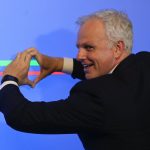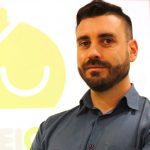DreamShaper – turning dreams into startups
Miguel Queimado, Pedro Queiró and João Borges are three Portuguese entrepreneurs who are changing the way ideas formed by university students are turned into realities.
They are conquering educational establishments and institutions in Brazil through their platform DreamShaper providing students with ideas to turn them into successful startups using their platform of tools DreamShaper.
And they have recently won a €2 million investment round after meeting investors last year at Web Summit.
“We did a pilot two years ago to see how our platform would work and last year Pedro and I talked to around 30 venture capital fund investors and ended up by closing this investment round in October this year” says Miguel Queimado.
“It was pretty clear to us that the educational system needed to adapt to 21st century kids and we had felt this in our own skin and from our own experience. We started researching this and what we were able to learn that the education world needed and admitted that it had to change, and was trying to do so via the so-called Active Learning methodologies like project-based learning, collaborative classroom based learning.
These are new pedagogical ways of learning which are more motivating and engaging for the students but also help them learn better and learn social and emotional skills as well which is so important for them to be successful in the market and in their personal lives as well”, explains João Borges.
From a business perspective education worldwide is a US$5 trillion industry with around 1.5Bn students in the further education market alone. “It’s a huge industry that really hasn’t been disrupted by technology and we felt that within the education system there was the need for some tool to help students and teachers make this change which they know is so necessary but can’t seem to easily implement” he adds.
Borges says that one of the big problems that so many Portuguese students underperform at school is because of their lack of motivation through the methods through which they are still being taught and which are not fit-for-purpose in today’s digital, technologically driven world.
“Kids today at school often don’t understand how what they are leaning will help them in the real world and not just in Portugal but in many countries because education is a very traditional old-world sector which has been resistant to change” he continues.
Borges adds that governments are now changing while companies like DreamShaper aim t help schools do this in an easier way.
Launched in 2014, the software is used annually by around 17,000 students and 96 partners and is already paying dividends to its investors.
The platform which was developed in Portugal has enabled phased business plans to be developed covering business opportunities, concept testing, marketing and business plans and tools including tutorial videos.
Apart from the financial aspects, DreamShaper also focuses on educational and student behavioural components. In some cases, this platform actually works as a business pre-accelerator which uses the methodologies used by universities like Harvard, Stanford and Georgetown.
The content used by DreamShaper is developed in partnership with university teachers who supervise the progress. In the initial lessons, the students come up with ideas and brainstorm them to see if they are viable.
In the following lessons, the students are mostly focused on presenting the results of the research and work on the digital platform.
“When we started off in Brazil, there were very few courses on entrepreneurship and lecturers to actually teach that. Our software, on the other hand, unlike other projects in the education area, is not designed to work against the teachers, but to support them and this explains why it has been so successful” says João Borges in an interview with Essential Business at Web Summit in November.
With a tight team of 12, DreamShaper is divided between the Lisbon offies and its technology, product and content teams and Brazil which has the commercial, operations, research and customer support services.
To get to this point, the accelerator went through two ‘baptisms’ of fire. The first was in 2008 with Acredita Portugal which organises one of the largest and most important competitions for budding entrepreneurs in Portugal.
This event acted as an educational service open to all. “Our initial plan, since we were expecting few applicants, was to offer direct support for projects but there were 700 applications!” he adds.
The first version of DreamShaper had to be designed to cope with so many applicants and was a platform which aimed to teach entrepreneurship to anybody and help them to turn their dream idea into a practical working reality.”
At the time Miguel Queimado was working for McKinsey where he headed a special team of consultants advising Acredita Portugal. Then, a unique opportunity came up with the group Groupon and he had to dedicate himself to that full-time.
It took another six years before DreamShaper had a second wind and became a startup. “Brazil was the first market we went into because its economy was growing strongly at the time,” he explains.
Miguel Queimado got two others on board to join him in his venture who understood technology, marketing, education and sales for the business sector.
Pedro Queiró was a nuclear physics engineer at Lisbon’s Higher Technical College (Técnico) and João Borges who worked for a data sales company in Brazil. Their initial startup investment was €750,000 from their own capital outlay.
Six months later, “Brazil’s economy went under in the crisis and the three ‘walked through fire’ and keep costs to a minimum and be tenacious, creative and resilient”.
As the Brazilian economy began to recover, the startup began to look at other markets like Argentina, Chile and Mexico and for this needed venture capital.
Now DreamShaper is developing technology for payment platforms for consumers. It also has a project called Project Life (Project Vida) aimed at helping young people in their first year at university to discover what they want to do in the future.
“Basically we are helping schools, students and teachers to adapt to the demands of the 21st century by developing communication programs that are more engaging and practical for the students.”










